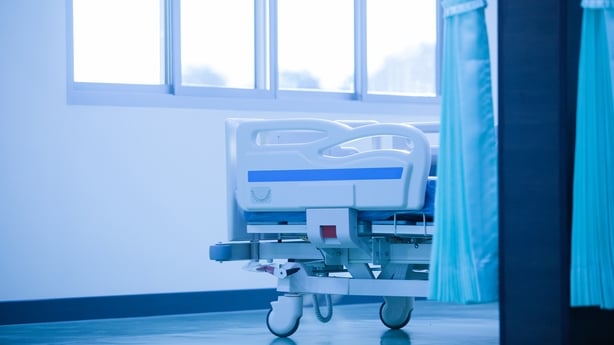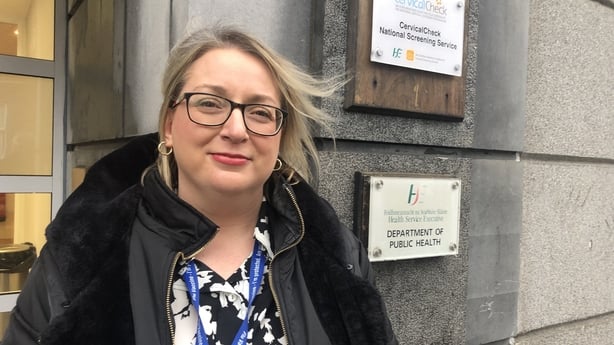Ireland is in the midst of a "medical workforce shortage", according to the Irish Medical Organisation's Chairman of the Consultant Committee, Dr Matthew Sadlier.
"We are facing an international, global medical workforce shortage," he said on RTÉ's Drivetime.
"We are competing against countries like Australia and Canada for doctors and frankly we are losing those competitions in being able to recruit doctors."
Dr Sadlier said it is "increasingly difficult" to recruit junior doctors and there are many vacant consultant posts.
He added that if the solution is to make the doctors already in the system work longer hours that will lead to increased burnout.
The IMO has been "shouting" about the lack of resources for decades, he said.
"At every meeting we have had, at every annual general meeting where we get press coverage, we have been shouting about this issue of under-resourcing and the under physical capacity of the number of beds in our service for as long as I have been involved in the organisation, which is 20 years."

Earlier, Dr Sadlier said there was a very real likelihood that some patients will have died as a result of avoidable delays in the health system in recent weeks, according to the IMO.
He said there is an even stronger likelihood that Ireland will see further increased deaths and delayed diagnosis.
Some people who should go to Emergency Departments in the coming weeks will not now do so because of fears of what they have recently seen, Dr Sadlier said.
He added that it is critical that people understand that the current emergency is not simply a temporary winter crisis, or a result of a perfect storm of Covid-19, flu and respiratory illnesses, as these are merely the proximate causes of the latest crisis.
A new surge in RSV is being reported in the Mid-West health region of the country, which covers counties Limerick, Clare and north Tipperary.
The concern is that this will place even further pressure on University Hospital Limerick, which has the most overcrowded emergency department in the country.
The Irish Nurses and Midwives Organisation said that this morning, there were 44 patients at UHL waiting for a bed.
It said there were a total of 534 patients in emergency departments or wards waiting for a bed, with 56 patients waiting at Cork University Hospital; 36 at Letterkenny University Hospital and 31 at the Mater Hospital in Dublin.
Figures from the Health Service Executive also show there has been a rise in overcrowding compared with yesterday.
There were 395 patients on trolleys as of 8am, which is an increase of 41 on yesterday's number and 31% higher than this day last year.
The hospitals worst affected, according to the HSE, are St Vincent's University Hospital in Dublin with 38 patients waiting followed by the Mater with 31 patients waiting.
Cork University Hospital has 30 patients waiting for a bed, while there are 24 patients waiting at Naas General.
The HSE has put the number of patients with Covid-19 in hospitals today at 573.

A consultant in Public Health Mid-West said this is an "unprecedented" winter season due to the increase in respiratory syncytial virus (RSV), large numbers of flu cases and Covid-19.
Dr Marie Casey said: "This obviously makes it very challenging for the local health services and also is increasing the amount of sickness in the community."
She said that "what's unique about this year is that we're having all these seasons of these different infections at the same time, so normally there will be different patterns and there will be a bit of staggering.
"But what we're seeing is that there are high numbers of all the different types of infection at the same time, and that obviously is putting increased burden on our region."
Dr Casey said there is pressure on the capacity of hospitals to cope and the main challenges are more people attending GPs and more people attending hospital emergency departments too.
She said: "We're also seeing that people are infected with a number of infections as well, so not only having one virus, but maybe having two or even three...everything is coming at the same time. A bit of a perfect storm of infections," she said.
In a statement, INMO General Secretary Phil Ní Sheaghdha has again called on the Chief Medical Officer to issue "stronger public health advice" in relation to mandated mask wearing.
"It shouldn't be this difficult to issue strong advice in this regard when we are being warned about rising cases of flu, RSV and new Covid variants," she said.
"We know that we will be seeing continued pressure on our acute hospital system until the end of February at the very least. While we have seen decreases in those on trolleys in some of our larger hospitals, we are seeing high numbers of patients on trolleys in some of our smaller hospitals which is having a devastating impact."
People in need of serious care urged to seek help
Meanwhile, doctors have appealed for people in need of serious care to attend emergency departments rather than purposely avoid seeking medical care due to the overcrowding crisis and surge of respiratory illnesses in hospitals.
Speaking on RTÉ's Today with Claire Byrne, a consultant geriatrician at Tallaght University Hospital in Dublin said those in need of serious care are "almost certainly" staying away from hospitals amid overcrowding and a surge in infections.
We need your consent to load this rte-player contentWe use rte-player to manage extra content that can set cookies on your device and collect data about your activity. Please review their details and accept them to load the content.Manage Preferences
Dr Ronan Collins said that even though emergency departments were "somewhat chaotic" at the moment, people should still seek urgent care as is needed.
"Please, if you think there is something seriously wrong in terms of your breathing, in terms of symptoms of heart disease or symptoms of a stroke, please attend, and ring an ambulance as appropriate," he said.
Speaking on the same programme, Monaghan GP Dr Ilona Duffy said the so-called "perfect storm" of flu, Covid-19 and RSV had not abated.
She said doctors are still seeing high rates of Covid-19 in the community, probable influenza and RSV, as well as other viruses they would normally see at this time of year.
Dr Duffy said GPs are also seeing a reluctance in people, especially in older age groups, who are afraid to potentially spending a lot of time on a trolley.
"Many of them are afraid that if they go in and they're vulnerable and weak, that nobody will be allowed in with them, given visiting schedules in hospitals have been reduced due to high rates of illnesses at the moment," she said.
Vaccines still effective against 'Kraken'
A professor of comparative immunology and biochemistry has said evidence suggests that the new 'Kraken' Covid-19 strain is more transmissible than other variants, but that vaccines still provide protection against it.
Fewer than five cases of the strain – known as XBB.1.5 - have so far been detected in Ireland.
Speaking on Today with Claire Byrne, Professor Cliona O'Farrelly from Trinity College Dublin said the variant is still at the monitoring stage, adding that it was not yet known whether it makes people sicker.
"We do know that the vaccines we have overall are preventing huge numbers of deaths and huge amounts of serious illness, so people should feel really encouraged to get the booster, but also to encourage more and more research to get better vaccines," she said.
Additional reporting Fergal Bowers
